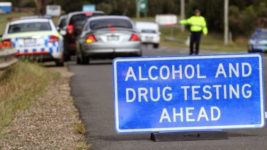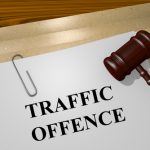Roadside Drug Testing Devices Are Unreliable, Study Reveals

Over the last five years, as the NSW Liberal Nationals government has been ramping up roadside drug testing – doubling the number of tests to 200,000 by next year – so too has the chorus of criticism about the testing regime been rising to crescendo.
The major bone of contention being that unlike random breath testing which ascertains whether a motorist is intoxicated and therefore unfit to drive, roadside drug testing does nothing of the sort. It merely tests for the presence of illicit substances, not driver impairment.
The four drugs that NSW police test for are cocaine, amphetamines, MDMA and THC: the psychoactive ingredient of cannabis. And questions have been raised as to whether people are testing positive for these drugs long after their effects wear off, especially in the case of cannabis.
And a recently released study carried out by Sydney University’s Lambert Initiative for Cannabinoid Therapeutics found that when it does come to cannabis the two roadside drug testing devices being used around the country are hopelessly flawed.
False readings
“This is not about driving impairment, this is about the detection of any form of THC in the saliva,” said Professor Iain McGregor. “And that’s a problem that a lot of lawyers and magistrates have about this.”
“We are all in favour of getting impaired drivers off the roads,” the Lambert Initiative academic director continued. “But, it’s not necessarily the case that it’s in the community interest that we criminalise anyone who has THC in their saliva.”
NSW police initially use the Securetec DrugWipe to test for illicit substances in motorists’ saliva. If a driver tests positive using this device, they’re then taken to a van and retested using the Dräger DrugTest 5000. And if positive again, a third saliva sample is then sent to a laboratory to be tested.
The study found that the DrugWipe device returns 5 percent false positives – a positive result that should be negative – and 16 percent false negatives, while the Dräger device results in 10 percent false positives and 9 percent false negatives.
Professor McGregor further told Sydney Criminal Lawyers that a roadside cannabis testing regime based on questionable technology shouldn’t be in place, “particularly, as we now have an official medicinal cannabis scheme in Australia, with more than 14,000 approvals for patients”.
Anybody’s guess
Both point-of-collection testing devices were set to a threshold of 10 nanograms per millilitre for the study. However, as the professor explained, when the research team consulted with the NSW Police Force regarding how it sets its devices for roadside testing, it refused to share that information.
“Could you imagine a situation where you’re not sure where a breathalyser is going to be set, so you have no idea what level of alcohol is going to be safe?” Professor McGregor asked, adding that even following the release of the Lambert study, NSW police still won’t disclose that information.
The academic director further explained that he came across one case where a person with zero THC in their saliva produced a positive reading, which means false positives are not only possible with extremely low levels of THC, but also with none of the substance whatsoever in a driver’s salvia.
“The problem is that it takes a long time for confirmatory testing to be done,” Professor McGregor said in relation to false positives. “So, you could have a criminal action above your head for several months, while they’re doing the confirmatory testing.”
Heilpern’s acquittals
The NSW Centre for Road Safety states on its website that cannabis can be picked up in a person’s saliva typically for up to 12 hours. However, this limit has been widely disputed as being too narrow. And it’s been found not to be a rule to rely upon in Lismore Local Court on a number of occasions.
Magistrate David Heilpern found Robert Collier not guilty of drug driving on the 25 July this year, as it was found that he’d tested positive for THC in May, two days after he’d had a few tokes on a joint. Collier thought he was fine to drive going by the 12 hour rule.
Back in February 2016, the magistrate also ruled that Joseph Carrall was not guilty of drug driving, as he’d waited for nine days before getting behind the wheel after smoking cannabis. Carrall had based the timeframe on the advice of a police officer, who told him to wait at least a week.
While in April this year, Magistrate Heilpern further found Nicole Spackman not guilty of drug driving, as she testified to not having smoked cannabis for weeks prior to testing positive, but she had visited a terminally ill friend who’d been smoking for medicinal purposes in front of her.
“Shoddy science”
Professor McGregor explained that “THC lodges in the fat stores of your body”. He said that the record for it remaining in the system of a heavy smoker is six months. But, on a regular basis for a big cannabis user he’d say about four to six weeks. And this applies to showing up in urine, not saliva.
In the case of testing for alcohol levels with a breathalyser, the technology and drink driving laws are “almost beyond reproach”, he made clear, as there’s a direct correlation between alcohol in the blood and breath. And he added that the science is the “culmination of about 50 years of research”.
While scientists are working on a “cannabisalyser”, the professor doesn’t hold much hope for it. And he suggests a more traditional field sobriety test as the way to go at present. This would involve a series of physical and mental tests designed to detect whether a person is under the influence.
As for roadside saliva testing, Professor McGregor said that “the more fat you’ve got in your mouth, the more that THC will probably hang around”. He further set out that the research is “extremely complicated and the science is in its infancy”.
“And we certainly should not be criminalising people while the science is so poorly understood,” he concluded.
Going to court for a traffic offence?
If you are going to court for a traffic offence, call or email Sydney Criminal Lawyers anytime to arrange a free first consultation with an experienced, specialist traffic lawyer who will accurately advise you of your options, the best way forward, and fight for the optimal outcome in your specific situation.







